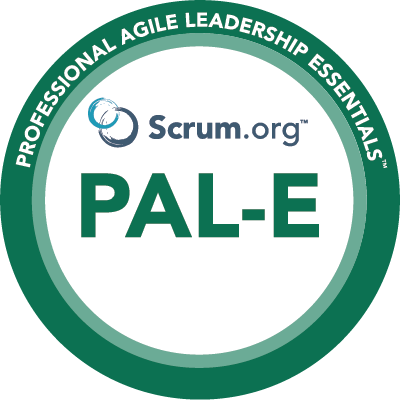Professional Agile Leadership Essentials (PAL-E) Certification: A Comprehensive Guide to Agile Leadership

Introduction to the PAL-E Certification
Overview
The Professional Agile Leadership Essentials (PAL-E) certification by Scrum.org is designed to help leaders and managers understand their role in enabling Agile transformation. As companies increasingly adopt Agile practices, the need for leadership that fosters Agile principles has become crucial. The PAL-E certification focuses on how leaders can create an environment that empowers Agile teams, promotes adaptability, and encourages continuous improvement.

Key Facts
- Launch Date: The PAL-E certification was introduced in 2017 by Scrum.org.
- Certified Professionals: As of 2023, over 5,000 professionals have earned the PAL-E certification.
- Founder: Ken Schwaber, co-creator of Scrum and founder of Scrum.org, developed this certification to help leaders better understand how to support Agile teams.
Target Audience
The PAL-E certification is aimed at managers, executives, leaders, and Scrum Masters who are responsible for fostering Agile transformations within their organizations. It is particularly useful for those leading or coaching Agile teams and wanting to strengthen their leadership skills in an Agile context.
Certification Objectives and Learning Outcomes
Core Learning Objectives
The PAL-E certification is structured to help leaders:
- Understand how Agile leadership impacts the success of Agile teams and the entire organization.
- Learn how to support and coach Scrum teams to deliver better results.
- Grasp the principles of empirical process control and how to create an environment conducive to continuous improvement.
- Develop strategies to handle organizational resistance and foster a culture of trust and collaboration.
Skills and Knowledge Gained
Professionals who complete the PAL-E certification will gain:
- Deep insights into the Scrum framework and the Agile mindset, including how leadership can empower teams.
- Skills in creating alignment between business objectives and team outcomes.
- The ability to measure and improve team effectiveness, ensuring they align with the organization’s goals.
- Competence in building and maintaining high-performing Agile teams.

Benefits to Professionals
- Career Growth: The PAL-E certification helps managers and leaders elevate their roles by enabling them to lead Agile transformations and build Agile cultures within their organizations.
- Enhanced Leadership: Certified professionals can drive organizational change, foster empowered teams, and implement continuous learning practices that are essential in Agile environments.
- Marketability: With the growing demand for Agile leaders, holding a PAL-E certification significantly enhances your employability and positions you as an expert in Agile leadership.
Detailed Breakdown of the Certification Process

- Pre-requisites: There are no formal prerequisites for the PAL-E certification, although it is beneficial to have experience with Agile practices or Scrum. Leadership experience is also recommended for getting the most out of the training.
- Training Requirements: Scrum.org offers a two-day Professional Agile Leadership Essentials (PAL-E) workshop, where participants explore real-world case studies and engage in practical exercises. The training focuses on leadership skills, creating Agile environments, and improving team dynamics.
- Exam Format:
- Number of Questions: 36 multiple-choice, true/false, and multiple-answer questions.
- Time Limit: 60 minutes.
- Passing Score: 85%.
- Retake Policy: If a candidate fails, they can retake the exam by purchasing another attempt. There is no limit to the number of attempts.
- Certification Levels: PAL-E is a single-level certification that focuses on essential leadership skills for Agile environments. For advanced leadership training, individuals can pursue other certifications such as Professional Agile Leadership – Evidence-Based Management (PAL-EBM).
- Recertification: The PAL-E certification is valid for life, making it a one-time investment with no need for renewal.
Key Benefits of the Certification for Organizations
Impact on Teams and Organizations
The PAL-E certification equips leaders to foster high-performing teams and create a culture of continuous improvement. Organizations benefit from improved productivity, enhanced team autonomy, and better alignment between business goals and team outputs. Leaders with PAL-E certification are equipped to address common organizational challenges such as resistance to change and ineffective team dynamics.
Real-World Application
Companies like Google and Spotify have leveraged PAL-E-certified leaders to drive their Agile transformations, resulting in faster product releases, enhanced team collaboration, and improved responsiveness to market changes.
Industry Recognition
The PAL-E certification is recognized by top global organizations, including Microsoft, IBM, and Siemens, that seek professionals who can lead Agile transformations and build teams that can adapt to changing market needs.

Case Studies
At ING, the PAL-E certification was instrumental in guiding the bank’s Agile transformation, enabling leaders to support their teams effectively. The results included a 30% improvement in delivery time and better alignment between team performance and customer expectations. Similarly, BMW used PAL-E-certified leaders to build a strong Agile foundation across its development teams, leading to improved collaboration and innovation.
Certification Costs and Value Proposition

Cost of Certification
The PAL-E certification exam fee is typically $200, while the cost of the two-day PAL-E workshop ranges from $800 to $1,500, depending on the location and training provider. These fees cover comprehensive training and access to course materials.
Return on Investment (ROI)
For professionals, the ROI of the PAL-E certification is substantial. Certified leaders can expect an increase in salary due to their enhanced ability to lead Agile transformations. For organizations, employing PAL-E-certified leaders leads to improved team efficiency, faster time-to-market, and better alignment between teams and organizational goals.
Financial Aid and Discounts
Many Scrum.org training partners offer group discounts for teams or organizations looking to certify multiple leaders. Some companies also sponsor their employees’ certification as part of broader Agile transformation initiatives.
Comparison with Other Certifications
Competitor Analysis
The PAL-E certification can be compared to certifications like SAFe Agilist from Scaled Agile and Certified Agile Leadership (CAL) from Scrum Alliance. While SAFe Agilist focuses on scaling Agile across large enterprises, PAL-E concentrates on leadership essentials for creating effective Agile environments at all levels. The CAL certification also emphasizes leadership but may not offer the same level of practical application as PAL-E.
Unique Features
PAL-E’s primary strength is its practical focus on leadership in Agile environments. It provides leaders with the tools and knowledge to support Agile teams, foster a culture of empowerment, and drive continuous improvement. The certification’s framework-agnostic nature also makes it applicable across a wide range of industries and organizational structures.
Industry Trends
As organizations shift to remote work and face growing demands for Agile scaling, PAL-E-certified leaders are well-equipped to manage distributed teams, ensure alignment with business goals, and drive digital transformations.

Success Stories and Testimonials

Case Studies
At Amazon, PAL-E-certified leaders played a key role in accelerating the company’s Agile transformation, leading to more streamlined product development and faster release cycles. In Siemens, PAL-E certification helped leaders build Agile cultures that enabled their teams to collaborate more effectively and respond to market changes with greater agility.
Personal Success
Jennifer Andrews, a Scrum Master at Spotify, shared how the PAL-E certification helped her lead her teams more effectively: “PAL-E taught me how to create an environment where teams feel empowered and take ownership of their work. It transformed how I lead and coach teams.”
Notable Companies
Global companies like Intel, IBM, and GE require or encourage their leaders to obtain PAL-E certification as part of their Agile transformation strategies, demonstrating the widespread recognition and value of the certification.
The Future of Agile and This Certification
Emerging Trends
As Agile at scale becomes more prevalent, organizations are increasingly looking for leaders who can foster cross-functional teams and manage Agile transformations across multiple departments. PAL-E certification equips leaders to address these challenges by teaching them how to create an Agile culture and align team objectives with business strategy.
Future Updates to the Certification
Scrum.org continually updates its certifications to reflect new trends in Agile leadership. Future updates to the PAL-E certification may focus on emerging areas like AI-driven project management, remote leadership, and the integration of Agile frameworks in hybrid work environments.
Relevance in a Changing Market
The PAL-E certification remains essential as organizations continue to shift toward Agile methodologies in response to the evolving market. PAL-E-certified leaders are prepared to guide teams through digital transformation, ensuring that their companies remain competitive and adaptable in a fast-changing business landscape.

Conclusion
The Professional Agile Leadership Essentials (PAL-E) certification is an essential qualification for leaders looking to drive Agile transformations within their organizations. With its focus on practical leadership skills and fostering Agile cultures, PAL-E helps leaders build high-performing teams and align team outcomes with business goals. Whether you’re an executive, a manager, or an Agile coach, the PAL-E certification provides the tools and insights needed to lead successful Agile transformations.